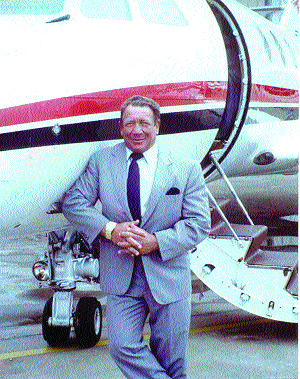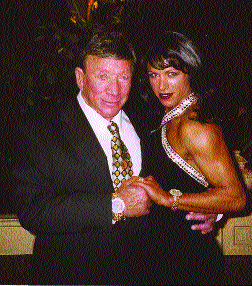By Karen Di Piazza
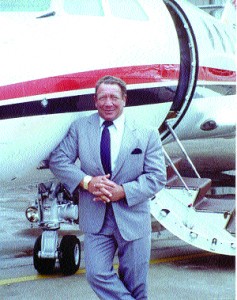
Ray Stern, CEO of Worldwide Jet, Addison, Texas, flies his Falcon 20 for business and pleasure trips.
Ray “Thunder” Stern, CEO of Worldwide Jet (formerly Stern Air Company) at Addison Airport, is just as powerful as his name implies.
Born out of the Depression era and in the city that is home to the Empire State Building, he created his own empire. He became a world champion wrestler, pilot and real estate developer, as well as founding the first coed health fitness/racquetball club in the U.S.
The Forth Worth resident has also written two books, “Power Of Thunder: The Rags to Riches Story of One Man’s Adventure of Fame, Fortune, Romance and Fitness” (Wolf Creative Group, 1994), and “Fit and Sexy Over 50” (RTR Publishing, 1996), a self improvement book that shows you how to live healthy, eat the proper foods, exercise and have a great sex life.
In 1956, Stern, 23, was inducted into the International Wrestling Hall of Fame, and became world heavyweight wrestling champion and shared the tag-team title. He continued to hold his title as heavyweight champ in 1957, 1958 and 1959.
“Chronologically, I’m 69 years old; biologically, I feel 30 years old,” he says. “I have never smoked or taken drugs and instead of sitting back with a beer and potato chips, I exercise daily in my gym, which has kept me physically and mentally fit to continue flying.
As for flying, Stern says he’ll never forget his first airplane ride.
“I was 19, and one of my buddies took me up in his J-3 Piper Cub, which changed my life,” he said. “I knew at that moment, I wanted to become a pilot.”
Within days, he went to Davis Island, Tampa, Fla., and took flying lessons in between wrestling matches. In two short weeks, he had earned his private pilots license.
“Back then, there wasn’t a written, and I really didn’t know yet how to fly, but I bought a Bellanca Cruise Air and thought I’d try it out; amazingly, I lived,” he said.
For the first time, the neophyte pilot took off in the blackness of night. In a hurry to make his next match in Houston, he became lost. Not sure of what to do, he decided to climb and look for an airport. His fuel was running low and he noticed city lights below. He circled several times.
Retired Air Force pilots, working at a mobile-home factory located on a deserted World War II airfield, became alarmed when they noticed the plane circling above their heads was in trouble. They wasted no time; they turned their car headlights on and shined them toward the runway so he could land.
“That’s how I ended up in Bonham!” he laughed. “The next morning the local newspaper headline read, “Brooklyn Wrestler Lost Over Vast Texas Sky.”
Stern promised himself he’d learn how to fly—more importantly, navigate—so he wouldn’t kill himself or someone else.
After that harrowing experience, he decided to fly from St. Louis, Mo., to Brooklyn. The weather had turned sour; again, he became lost. This time when the fuel started to drop, he landed in a wheat field in Dixon, Mo. After a local townsperson gave him a ride to the nearest gas station, he returned and attempted takeoff, but the field was too damp. Stubbornly, the gear would not budge from the soft ground; the Bellanca nosed over, causing the propeller to break.
“On my way back to St. Louis, to buy a new prop, I asked myself, ‘Do I really want to fly?'” he said.
After the mechanic installed a new Aero-Matic propeller, he took off and started to climb, but he noticed the engine wasn’t going to full power; he pulled the flaps just in time, missing the trees that were directly in front of him. Luckily, he was able to land at a nearby airport. Again, he would have to hire a mechanic.
“While waiting for repairs to be made, I pondered the nerve-racking incidents over in my mind,” he said. “I decided to stay in aviation.”
Often he would fly from San Francisco to Detroit to make a match, and then head for Denver for another match, and then return to San Francisco in time to open his fitness clubs on a Monday morning. He decided if he had a larger and faster plane, it would help lighten his gruesome schedule; he purchased a Beechcraft Twin Bonanza.
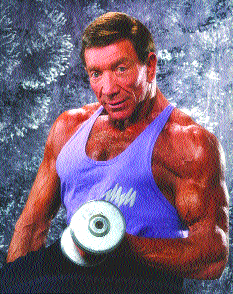
Ray “Thunder” Stern received his nickname from the National Wrestling Alliance after he dropkicked an opponent to the floor.
“There is nothing in the world I loved more than weightlifting, but aviation was a close second and I developed an obsession for it,” he said.
His obsession led to the purchase of a Pitts Special, several Aero Commanders, numerous Cessna 310s and a de Havilland Dove.
Stern became bored with flying for transportation purposes; there was no challenge in it. When he was not facing a challenge, he looked for one. He challenged himself to win the world aerobatic championship.
“I could well afford it; I had made a million dollars by the time I reached 23; other than purchasing my first Cadillac, which was very exciting, I spared no expense in getting the best equipment available to train for aerobatics,” he said.
He purchased two Czechoslovakian aerobatic planes and traveled to Czechoslovakia five times to train with their national aerobatic champion. He wanted more training, but couldn’t afford to miss a wrestling match, so he simply paid the Czechoslovakian champ to come to the U.S.
Stern didn’t become the world aerobatic champion, but he did place fourth in the unlimited division and twice he was chosen as an alternate for the world championships.
“Sometimes you don’t get what you want, but if you don’t try, you’ll never know,” he said.
He continued with his aerobatic flying and on one occasion, he nearly escaped death while flying his Pitts over the skies of Fort Worth, Texas.
“I was flying at 1,500 feet making loops and passes when I noticed the instrument panel indicated there was no oil pressure,” he said. “All of a sudden the engine stopped! The plane began falling out of the sky towards earth like a rock. My forehead, palms and entire body began sweating profusely; my mouth opened and out came the words, ‘Control, Ray! Keep the plane under control!’
“Amazingly, I was able to fly the plane in a crab—one wing down and using the opposite rudder—so I could see. There were power lines directly in front of me; I nearly missed the first set and I had to put the plane into a dive to miss the other set. The lines were too close; I could’ve reached outside of the cockpit and touched them. I had no choice and landed right in the middle of a highway, which had a group of bikers on it; they quickly moved.”
Stern sat inside of his cockpit for a long time trying to get over the shock of what had happened.
One of the bikers approached him, swearing and accusing him of hitting his friend. After the motorcyclist saw 240 pounds of mean, lean muscle climb out of the cockpit, he ran!
Stern Air Company
In 1978, Stern started his charter aviation company.
“Like so many thing in my life, I formed Stern Air Company by accident,” he said.
While he was doing aerobatic flying, the Federal Aviation Administration gave him permission to practice in a designated area, which upset a nearby flying school.
“I believe it made the students and instructors nervous,” he said. “Someone from the school told the FAA that I had been doing aerobatics over the North Park Airport. That was insane! The FAA watched me carefully. For me to do aerobatics over the area that they claimed would be the same as driving 100 miles per hour in a 50-mile-per-hour zone with a highway patrolman behind me.
“The situation turned into a mess; through the miscarriage of justice, the FAA revoked every one of my pilots licenses. Not only that, I had to wait a year before I could apply for another license, which meant I would have to go through school again, beginner to advanced.”
Stern was angry and almost decided not to renew his license.
“I was being stubborn and I knew it, but to me, it was the principle of the thing,” he said. “It was a ridiculous thought; I already had 6,000 logged flight hours.”
Once he made the decision to fly again, in one month he went from student pilot to airline transport pilot. Since then he says he’s flown an additional 5,000 hours all over the world as a captain in Lears. He added that owning a Lear had always been one of his dreams.
“It’s a magnificent airplane,” he says. “The speed, altitude, capabilities, custom features, design and quality make the Lear synonymous with prestige, as does the price; it’s millions of dollars.”
He couldn’t justify spending that kind of money on an aircraft, or the maintenance that went along with it, unless he used it for some kind of business.
“My first jet was used for chartering, cargo and air ambulance services,” he said.
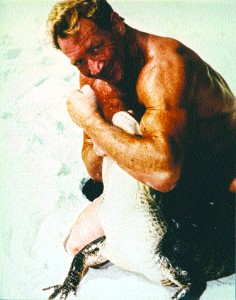
At 46, as a promotional gimmick, Ray Stern took on a friend’s bet that he couldn’t wrestle a crocodile.
Stern Air grew quickly, and within a short period the company owned five Lears and two Falcon 20s. In addition, it expanded its operation with a service center.
“I wanted my company to overhaul the gears on these jets; the Falcon Jet Corporation refused to sell me the parts,” he explained. “A landing gear company in France was maintaining a monopoly, so I decided to take action and do something to change that situation.
“I met with the company’s CEO, and explained that the monopoly was considered to be a restraint of trade; the U.S. government wouldn’t have looked favorably upon that. We worked things out between us; within a matter of a week, we had the landing gear parts. We were able to do 99 percent of any repairs and modifications to Lear and Falcon jets in-house.”
Stern then decided to sell his own fuel, with or without the airport’s permission.
“A Lear or Falcon jet will guzzle 250 gallons of fuel per hour,” he said. “In many airports, one company will have a monopoly on selling jet fuel, which means you’re stuck paying their price—no ifs, ands or buts about it. I had to break that monopoly.”
Through a series of intense negotiations, he found a supplier at one-third the price.
“I had broken the rules and small aviation companies were happy to save money,” he said.
Stern said that he’s fortunate to have had the most experienced and committed aviation specialists in the world on his team.
“It’s been said that people are important to your business,” he said. “That’s a mistake. People are your business; make no mistake about it. I couldn’t have built my multimillion dollar business without them.”
Stern’s clients know whom to call when they need something done that they can’t or won’t do themselves.
As a line captain, he gained the reputation among Texas oil field companies as being “the pilot” to depend on when critical materials had to reach the Middle East and beyond. Texas Instruments called upon Stern for help when they didn’t want to fly their own jet to El Salvador, because of hostilities and threats of hostage taking.
Worldwide Jet
Stern renamed his company Worldwide Jet several years ago; it is primarily a charter service now. Today, he has one Learjet and two Falcon 20s and continues to fly all over the world for pleasure or business.
“I’m a fortunate man; I’ve been able to fly and see most of the world and each country holds a special place in my heart,” he said. “One of my favorite spots is Puerto Vallarta, Mexico. Back in 1960, the place was primitive. You could only get there by boat or plane; there was a one-lane jungle road, which all the jungle buses would travel. I bought a condo there on the beach.”
He’s made 50 trips to El Salvador.
“I remember sitting out on my balcony eating breakfast and looking out at the ocean and hearing rocket, mortar and rifle fire in the near background. It was an eerie feeling,” he recalls.
He said flying to Mexico City, Mexico was interesting.
“I’d fly in for a wrestling match and because the arena was located 7,600 feet above sea level the air was thinner, which caused us to run out of breath much faster; you don’t need that when you’re in the ring,” he said.
Stern’s wild adventures
Does “Walter Bookbinder” ring a bell? No? Stern didn’t think it would either; he changed his birth name legally at age 17, hoping it would get headlines.
“Stern was my mothers maiden name and I liked the way ‘Ray’ went with it,” he laughed. “How would it have sounded, ‘Walter Bookbinder, named Rookie of The Year’?” (1950, Madison Square Garden, N.Y., National Wrestling Alliance)
Stern grew up in Brownsville, which was the “poor” section of Brooklyn.
“We lived in a two-bedroom apartment that had one bathroom,” he said. “I shared it with my parents, my aunt, my two cousins and my grandparents.
Then, my sister Roberta was born when I was 10. In contrast today, I have a bathroom for every bedroom; tough times have a way of making you want to avoid inconvenience.”
Stern’s father considered himself one of the last “blue-collar Jews” in the U.S.; he worked as an electrical welder, cab driver or took on just about anything that would put food on the table.
In Stern’s mind it wasn’t the American Dream that was promised—the Depression had taken its toll.
Stern recalls the winter months as not being his favorite time of year.
“Many times the streets were filled with snow, mud and salt,” he said. “As I would make my way to the subway or bus station—we were too poor to own a car—cars passing by would splatter the mud, salt and dirty snow all over my clothes and face.”
He escaped the cold reality of Brooklyn by going to the movie theatre.
“I would see Clark Gable and Cary Grant with expensive cars, beautiful clothes and beautiful women,” he said. “They even spoke beautifully; they spoke differently than we did in Brooklyn. I promised myself that one day I would have all of those things.”
When he couldn’t afford to go to the movies, he would read books. As a result, he became a voracious reader.
One writer who had a major impact on Stern’s life was Jack London.
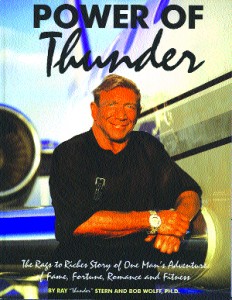
“Power of Thunder, The Rags to Riches Story of One Man’s Adventure of Fame, Fortune, Romance and Fitness,” chronicles Ray Stern’s life from 1933 to 1994.
“I read ‘White Fang,’ ‘The Call Of The Wild’ and ‘The Leper Colonies’; as I did,
I started visualizing myself in the role of his adventurous characters,” he said.
“I would fantasize about being on the waterfront or in barroom fights. I fantasized about traveling all over the world and living the life of my dreams. London came out with a book that was his autobiography, only with a fictitious name, ‘Martin Eden.’ That book changed my life!”
That book became his life!
London was an oyster pirate at age 13; Stern wondered what he could do to see the world and experience the same great adventure. He decided to become a Merchant Marine.
The Merchant Marines was a civilian organization; the Coast Guard controlled it. To join, you had to belong to the union. The only problem was that Stern was a minor.
“I used my 19-year-old friend’s birth certificate and changed my identity to ‘Paul Davis,”‘ he laughed. “Now I needed money so I could run away from home.”
He stole $12 from his grandmother’s purse, and purchased a two-way bus ticket to Norfolk, Va.
Upon arrival, he was turned away from the local Merchant Marine chapter; they were full. On his way back to Brooklyn, he stopped in Baltimore, Md., and found out that the Sailors Union of the Pacific were out on strike; he joined their picket line and supported them. In return, they promised Stern he’d get seaman’s papers so he could sail a ship.
His first night there he slept in an all-night strip tease movie house.
“That was depressing because there were derelicts around me; I was scared,” he said. “For the next two weeks I slept on a dirty floor in the corner of the Greyhound bus station.”
Waiting for a ship to accept him, he had to find a way to eat.
“I took a job selling hot dogs at a local football game; when no one was looking, I ate all of the dogs on my cart,” he said.
Finally, he sailed off on a ship and his first adventure was nearly spent behind bars.
“I ended up in a bar with some buddies; what a huge mistake,” he said. “The next thing you know, the bartender pulls out a butcher knife on me; I knocked him down and kicked him hard.”
Arrested at this point, he faced up to 10 years in jail with charges of assault and battery.
“I was scared and I confessed to my real age, which saved me; the police called my father,” he said. “To pay for the bail, my father hocked my camera that I had received for my Bar Mitzvah.”
Three days later, Stern disappeared.
“I got onto another ship and that was the last time my parents saw me for the next four years,” he said. “My parents were good people; they took care of me and I loved them, yet, something inside called—something that told me to seek the life of adventure and be like my hero, Jack London.”
Stern sailed on numerous ships and he had begun working out with a pair of 50-pound weights for something to do.
“I really had a good time lifting weights, which made someone think twice about messing with me,” he said.
On one of his sailing adventures in Hamburg, Germany, Stern’s eyes were opened to things children normally don’t experience.
“I met a beautiful German girl, and for five weeks, she brought me home to her mother and father’s house,” he said. “Imagine, after having dinner and spending time with her parents each night, we’d have sex in her room! I’d ride the train the next morning with her father on my way back to the ship.
As a 14-year old, coming from a strict, conventional family, this was quite a cultural shock. I’m sure it helped matters quite a bit when I brought her parents food and cigarettes each day.”
In 1949, Stern abandoned the adventure of sailing and traded it in for his love of bodybuilding.
The 16 year old ended up in Santa Monica, Calif.; the place then known as “muscle beach,” attracted bodybuilders, wrestlers and weightlifters from all over the world. Bodybuilding was in its infancy; it was a “brotherhood,” which fostered the development, advancement and means of the sport it has become today.
Armand Tanny, titleholder of the 1950 “Mr. USA” and “Mr. America” contest, was the first to tell Stern he should become a professional wrestler. He introduced Stern to Joe Gold (founder of Gold’s Gym and World Gym, Inc.).
“After Tanny gave me my first lesson, he had doubts about my wrestling ability,” he said. Gold and Armand were former Merchant Marines, so they both became “godfather” figures to Stern. They taught him how to wrestle and how to get women.
“You don’t run with that crowd without proving your manhood, even if you’re only 16,” he said.
During his first workout, he took a bad fall and seriously injured his hand.
” I thought, ‘My God, I must be crazy to want to become a wrestler; this is insane,'” he said.
In 1950, Stern went back to New York in hopes that wrestling promoters Rudy, Ernie and Amil Dusek would take him on.
“When I walked into their office, my eyes nearly came out of my head,” he said. “The Dusek brothers were everything that I had heard—big, mean and ugly. They were unlike any humans that I had ever seen! I was horrified. Ernie’s ear had been featured on the cover of ‘LIFE’ magazine; he had cauliflower ear. They called me ‘kid’ and told me to ‘get the hell out of their office.”
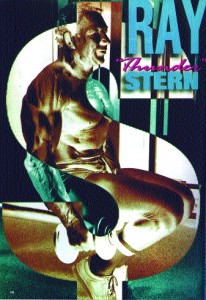
“I started weightlifting to attract women; I continued it throughout my life because it’s a great anti-aging technique that really works,” said Ray Stern.
Stern started winning in the ring; At Dayton, Ohio, at Hobart Arena, he took on world champion Buddy Rogers and won.
In 1951, Stern met his “Ruth.”
“My hero Jack London married a girl named Ruth, and of course, I had to do the same,” he said. “I believed, like so many young, impressionable, testosterone-filled lads, that I had found true love.”
Stern realized he had made a mistake and divorced his wife. Then, in 1954, he met Clare Hasse, who convinced him that he could become a “successful businessman.”
“Clare was a lot smarter than I was; she told it to me the way it was,” he said.
Hasse gave him an ultimatum; he could become a successful businessman, or she would leave him. They split up for a while, got back together and married in 1956.
Together they co-founded the “Ray & Clare Stern Health Club,” which was a health club dedicated for women only in San Francisco, Calif.
Looking for a marketing gimmick, Stern realized it was a popular fashion statement for women to wear wigs back then. Elizabeth Arden sold wigs for up to $800 each. Therefore, he decided to give away a free wig to every woman who bought a membership.
In 1957, the Sterns took a gamble and opened the first coed fitness/racquetball club in the U.S.
With the help of a friend who had expertise in real estate/development, Stern shifted gears and became a real estate developer. His first projects were a 12-unit condominium building, then a 36-unit and then a 72-unit project. He continued to design, develop and build properties and ultimately built high-rise apartment buildings in California and Texas.
With all the money rolling in, he soon realized that by forming his own finance/management company, he could keep more of what he made.
When he began, he said he had five health clubs and several apartment projects going.
“It only made financial sense to underwrite the membership contracts that we were selling,” he said. “I had nearly 500 people working for me during that time.”
Stern had built up an empire; his marketing shrewdness was pivotal to his financial success. In fact, those instincts were catalysts to his success; they made up for what he didn’t get in the way of a formal education.
Stern would purchase property and sell his “concept” to potential buyers before ground broke by showing them a mock-up; sometimes extreme marketing maneuvers were called for to get the “dotted line” signed.
“Clare and I would take perspective buyers for a ride; using a huge crane, they were lifted up in the air and we’d show them where their new condo would be,” he said.
After an ominous mechanical arm hoisted buyers up, the term “show me the money,” became secondary.
Stern moved to Texas and reopened his fitness club, which was very successful, and then leased it out. His marriage to Clare wasn’t as successful, and the couple later divorced.
Two failed marriages didn’t stop Stern from deciding to pursue marital bliss further. He is married to Debi Lee, a 41-year-old professional fitness competitor, who is also a certified flight attendant.
“I decided to do that in case Ray should ever need anything, but I don’t think he will; he’s a ball of fire to keep up with,” she said.
The Sterns, who workout together, also travel all over the world.
For more information on Worldwide Jet, please call (972) 980-2933.











